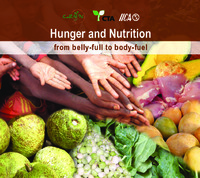| dc.description.abstract | Part I-Exploring Hunger, discusses the various definitions and interpretations of the word hunger, its causes and global efforts to eliminate its extreme forms. Particular focus is placed on Goal 1 of the Millennium Development Goals (MDGs) which specifies the need to eliminate extreme hunger by 2015, with a focus on the vulnerable. This is based on the traditional understanding of hunger as ‘not enough food’ and hence a state of starvation and ultimately, ill-health. This traditional understanding led to a similarly traditional response of providing food, which according to Lennox Lampkin was merely ensuring ‘belly-full’. While such strategies are necessary and cannot be faulted in cases of extreme hunger, they are certainly not sufficient in all situations. This provides the basis for understanding hunger from another perspective, i.e., as having enough food but not consuming enough nutrients, or body fuel, which leads to the same outcome, ill-health. This sets the tone for the rest of the discussions on aspects of hunger, nutrition and health. Part II-Understanding Nutrition, draws from the contributions of Nkosi Felix and Lisa Hunt as they cite and locate elements of nutrition research in a Caribbean perspective. Attempts are made to clarify the concept of nutrition, underscoring both the benefits of proper nutrition and the adverse effects of poor nutrition on health. Both contributors emphasise nutritional guidelines as an important framework and information tool to support healthy consumption choices. Unfortunately, as Hunt noted, consumption patterns have shifted over time, away from recommended guidelines, towards ‘Western diets’ characterized by over-utilization of highly refined and processed foods. This process of ‘nutritional transitions’ is still having adverse consequences on health. Part III-Food the pathway to hunger alleviation and health, recognises that food and nutrition are not synonymous. Food is an important source of hunger alleviation, nutrition and ultimately, health. Therefore an efficient food system is critical. However, understanding of the food system depends on whether its products are classified based on trade commodity definitions or based on nutrient content. This has complicated the process for rooting food system policy on nutrition. | |


